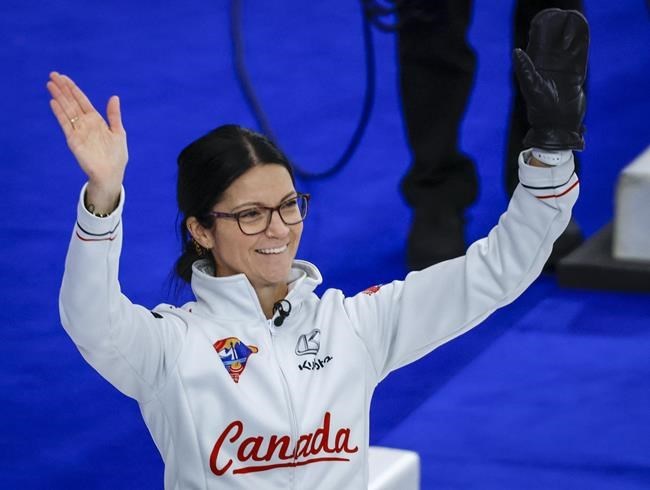Winning four Canadian women's curling championships in a row was "bloody hard to do in hindsight," says Colleen Jones.
Nova Scotia's Jones, Kim Kelly, Nancy Delahunt and Mary-Anne Arsenault comprise the only team to win four consecutive Scotties Tournament of Hearts titles, which they achieved from 2001 to 2004.
Kerri Einarson's foursome can join Jones and company in curling's history books with a fourth straight win at this year's national championship, starting Friday in Kamloops, B.C.
"I definitely think about it and it's only been done once before, but I also want to enjoy the moment," Einarson told The Canadian Press.
Einarson, Val Sweeting, Shannon Birchard and Briane Harris out of Manitoba's Gimli Curling Club return to national championship wearing the Maple Leaf yet again as defending champions.
"You don't always get to be Team Canada, so we're just going to embrace it and go out there and really enjoy ourselves and make some shots and not put so much pressure on ourselves," the skip said.
"I know we're going to have targets on our back and we're going to have to play really well, but that's like any other year."
What fuelled Jones to a quadruple was big-game experience begetting more big-game experience, she said.
"It becomes a 'I know how to do this feel,'" Jones said.
"At the time we were just feeling so confident, ready, primed and learned to thrive in big games and I think that's what Kerri's got going, so I think she's going to do it."
Einarson says her team's dynamics have come a long way since beating Ontario's Rachel Homan in an extra end in Moose Jaw, Sask., three years ago to claim its first of three straight.
"We've grown so much since then," Einarson said.
"I've definitely found that over the years that if you're getting into those big games, you are learning from them, getting that experience and feeling that feeling that you get on the ice, the pressure, the roar of the crowd, all of that. You just learn to go with it and it definitely does become a little easier."
Ranked No. 1 in the world, Einarson has reached the final of all four Grand Slams played so far this season, going 1-for-3 in those games.
Einarson opens defence of her Hearts titles Friday against Quebec's Laurie St-Georges at the 5,500-seat Sandman Centre.
Einarson isn't the only woman poised to rewrite the record books.
No woman has won seven national titles, but six-time champion Jennifer Jones of Manitoba, with an entirely new team this season, could be the first.
Jones and three-time champ Homan, also with a revamped lineup, are the main threats to Einarson's bid for a Hearts quad.
Quebec's St-Georges, Krista McCarville (Northern Ontario), Robyn Silvernagle (Saskatchewan), Stacie Curtis (Newfoundland and Labrador), Christina Black (Nova Scotia), Kayla Skrlik (Alberta), Suzanne Birt (Prince Edward Island), Clancy Grandy (B.C.), Andrea Kelly (New Brunswick), Kerry Galusha (Northwest Territories), Hailey Birnie (Yukon) and Brigitte MacPhail (Nunavut) round out this year's provincial and territorial champions.
What Colleen Jones didn't face during her run was three wild-card entries coming from the top three non-qualified teams in Curling Canada's ranking system (CTRS).
Curling Canada added a wild card in 2018 and bumped it up to three in 2021.
Jones' longtime vice Kaitlyn Lawes of Winnipeg, Casey Scheidegger of Lethbridge, Alta., and Meghan Walter of East St. Paul, Man., earned those berths in that order.
"I would say this is one of the strongest fields yet," Einarson said. "We're definitely going to be challenged and teams are going to play really well against us."
The 18 teams are divided into two pools of nine, with each playing an eight-game round robin.
The top three teams in each pool advance to the championship round.
The second and third seeds cross over to play Page playoff qualifier games.
Those winners continue to Page seeding games against the top teams from each pool.
From there, the winners advance to the Page playoff game between the top two seeds — that winner gets a bye to the Feb. 26 final — and the losers falling to the three-four game.
The loser of the one-two Page playoff drops to the semifinal to meet the winner of the three-four game
The Hearts winner represents Canada at the world championship March 18-26 in Sandviken, Sweden, and returns to the 2024 national championship in Calgary as the defending champion.
The victor earns $108,000 from a total prize purse of $300,000 and is eligible for Sport Canada "carding" money as part of Curling Canada's national-team program.
Curling Canada initially granted a pregnancy exemption to the top five teams in the CTRS, which allowed them to add to their Hearts lineup a free agent who didn't participate in provincial and territorial playdowns.
That encompassed Lawes' team at No. 4, but excluded Scheidegger's at No. 6 with two athletes pregnant.
After both female and male curlers questioned the exemption's logic, the national governing body expanded it to all teams in the Hearts field.
This year's Hearts is the first since Moose Jaw's three years ago to sell tickets.
Volunteers were allowed into the arena for the playoff round last year in Thunder Bay, Ont., and no fans entered Calgary's curling bubble two years ago because of the COVID-19 pandemic.
This report by The Canadian Press was first published Feb. 16, 2023.
Donna Spencer, The Canadian Press



